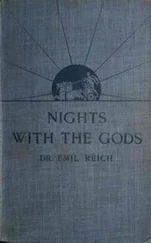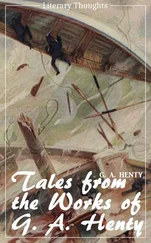Emil Reich - Nights with the Gods (Emil Reich) (Literary Thoughts Edition)
Здесь есть возможность читать онлайн «Emil Reich - Nights with the Gods (Emil Reich) (Literary Thoughts Edition)» — ознакомительный отрывок электронной книги совершенно бесплатно, а после прочтения отрывка купить полную версию. В некоторых случаях можно слушать аудио, скачать через торрент в формате fb2 и присутствует краткое содержание. Жанр: unrecognised, на английском языке. Описание произведения, (предисловие) а так же отзывы посетителей доступны на портале библиотеки ЛибКат.
- Название:Nights with the Gods (Emil Reich) (Literary Thoughts Edition)
- Автор:
- Жанр:
- Год:неизвестен
- ISBN:нет данных
- Рейтинг книги:4 / 5. Голосов: 1
-
Избранное:Добавить в избранное
- Отзывы:
-
Ваша оценка:
- 80
- 1
- 2
- 3
- 4
- 5
Nights with the Gods (Emil Reich) (Literary Thoughts Edition): краткое содержание, описание и аннотация
Предлагаем к чтению аннотацию, описание, краткое содержание или предисловие (зависит от того, что написал сам автор книги «Nights with the Gods (Emil Reich) (Literary Thoughts Edition)»). Если вы не нашли необходимую информацию о книге — напишите в комментариях, мы постараемся отыскать её.
presents
Nights with the Gods
by Emil Reich
–
"Nights with the Gods" was written in 1909 by historian Emil Reich (1854-1910) as a criticism of modern English society.
All books of the Literary Thoughts edition have been transscribed from original prints and edited for better reading experience.
Please visit our homepage literarythoughts.com to see our other publications.
Nights with the Gods (Emil Reich) (Literary Thoughts Edition) — читать онлайн ознакомительный отрывок
Ниже представлен текст книги, разбитый по страницам. Система сохранения места последней прочитанной страницы, позволяет с удобством читать онлайн бесплатно книгу «Nights with the Gods (Emil Reich) (Literary Thoughts Edition)», без необходимости каждый раз заново искать на чём Вы остановились. Поставьте закладку, и сможете в любой момент перейти на страницу, на которой закончили чтение.
Интервал:
Закладка:
"I asked one of their most famous specialists why the eyebrows of men are shorter than the moustaches. He did not know it. How could he? It takes the knowledge of at least five so-called specialities to answer such a question. I asked their most learned specialist in their language, why the English have dropped the use of 'thou,' although no other European nation has done so. He did not know it.
"They study a given subject when death has driven out all life from it. They do not trouble about language as a living organism, full of fight, of movement, of ruses, of intrigues, of sins and graces; but only of language when it lies motionless, a veritable corpse, on the table of the anatomical dissector and dictionary-fiend. They do not study a butterfly when it is in full life, flirting, pilfering, gossiping, merrymaking; but only when it is motionless, lifeless, pierced by a pin. This is how they get their specialities.
"Death indeed is the greatest of all specialisers. As soon as a man is dead, each hair or bone on or in his body takes up a separate line of decay, caring nothing for the other, full of scorn for its immediate neighbour, sulking by itself, wandering to the Styx alone and sullen.
"In England they have pushed that belief in specialities to a funereal degree. I wonder they allow a man to play one of their instruments, called the piano, with both his hands at a time. I wonder they do not insist that a given piece by Chopin be played by two men, one of whom should first play the part for the right hand, and afterwards the other man the part for the left hand. To play both parts at a time, and to have that done by one single man too,—what presumption! How superficial!
"In law they have long acted in this sense. There is one man, called the solicitor (—a very good name—), who plays the bass, or left-hand part with a vengeance, for several weeks. When that is done; when the 'hearer' or client lies prostrate on the ground from the infernal noise made by the solicitor's music, the solicitor hands over the whole case to the other man, the barrister, who plays the most tortuous treble, in a manner likely to madden Pan himself.
"The idea, accepted by all the other nations of Europe, that the whole prejudicial business of a legal contention might very well be left to one man, to a lawyer proper,—what presumption! How superficial!
"But when you tell them that they browbeat their own principle of specialisation by taking their judges from amongst late barristers, then they wax into an august anger. Yet no other nation does that. The function of a judge is radically different from that of a barrister. After a man has been a barrister for twenty years; after all his mind has taken the creases and folds of barristerdom; after he has quite specialised himself in that particular line, he is unlikely to have the best qualities of a judge. If a barrister cannot be a solicitor; why should he be at once, and suddenly able to become judge?
"Their arguments to that effect are most amusing. They dance a real war-dance round the truth that they mean to scalp.
"The truth of course is that all the three have one and the same speciality: that of running England. That country is lawyer-ridden, as Egypt was priest-ridden, or Babylonia scribe-ridden. The English being too proud to be stingy or petty in money matters, do not mind their rulers, the solicitors-barristers-judges, because these deprive them eventually only of what the English do not hold in great esteem, small sums of money. In France, where people cling fanatically to a penny, the barristers have not been allowed to become judges. In France specialisation in law has triumphed, where in England it has failed.
"Does that not show that specialisation is done, not in obedience to the behests of truth, but to those of interests?
"We Hellenes specialised on small city-states; we did not want to widen out indefinitely into huge states; just because we wanted to give each citizen a chance of coining out all his human capital, and not to become, like our slaves, a limited specialist. In a huge state specialisation becomes inevitable. In such states they must, more or less, sterilise the human capital of millions of citizens, just as we Hellenes sterilised the political capital of thousands of slaves.
"Specialisation is enslaving, if not downright slavery. It furthers truth very little; it cripples man.
"Just as a man who talks several languages well, will write his own idiom better than do his less accomplished compatriots; even so the man who keeps his mind open to more than one aspect of things, to more than one 'speciality' will be by far more efficient than his less broad-minded colleagues. Man may and shall invent, as I have long predicted it, highly specialised machines doing the work of the weaver, or the baker. But he himself must not become a machine. This is what happens 'now,' as the little ones say all over Europe and America.
"Not only have they formed states with many, many millions of people each. Worse than that, they have agglomerated the majority of these millions into a few towns of unwieldy size. In those towns specialisation is carried into every fibre of men and women. This desiccates them, disemotions them, sterilises them. We Hellenes gladly admit that the Europeans of the last four centuries have excelled us in one art: in music. But their period for this exceeding excellence is now gone.
"By over-specialisation of thought and heart, caused chiefly by over-urbanisation, the very wells of music begin to dry up. The music of the day is hysterical, neurasthenic, and false. It is the cry, not of an aching heart, but of an aching tooth, of a gouty toe, or a rheumatic nerve. It does not weep; it coughs phthisically. It does not sigh; it sneezes. It is a blend of what we used to call Phrygian and Corybantic rhapsodies.
"And as in music, even so in character. Where each individual distorts himself or herself into a narrow speciality, there people must needs become as angular, lop-sided, and grotesque as possible. They are, when together in a room, like the words on a page of a dictionary: they have nothing to communicate to one another. There they stand, each in his cage, uncommunicative, sulky, and forbidding. One thinks in F major; the other in F sharp minor. Harmony amongst them is impossible. Every one of them is hopelessly right in every one of his ideas; and of all mental processes, that of doubt or hesitation in judgment is the last they practise.
"A specialist does not doubt. Why should he? To him the most complicated things human appear as mere specialities, that is, as mere fragments. A woman is only a specialist in parturition. A physician is only a specialist in writing Latin words on small slips of paper. A barrister is only a man who wears neither moustache nor beard. A clergyman is practically a collar buttoning behind, and supported by a sort of man inside it. In that way everything is so simplified that no difficulty of comprehending it remains.
"All this clearly proves, O Empedocles, how right and, at the same time, how wrong you were in your view of the origin of things. Perhaps you were right in saying that the parts or organs of our bodies arose singly, or, as it were, as specialists. In times long before us there arose, as you taught, heads without necks; arms wandering alone in space; eyes, without foreheads, roaming about by themselves. But when you say that all this happened only at the beginning of things, you are, I take it, sorely mistaken. Indeed it is still going on in countries where specialism reigns supreme; at anyrate it is going on in the moral world. In such countries you still see arms wandering alone in space, or eyes roaming about without foreheads, as well as heads without brains flying about in space. Not literally, of course. But what else is a character-specialist cultivating exclusively one quality of the human soul than an arm wandering about alone? The little ones must come back to the Hellenic idea of seeing things as a whole, and not, as do wretched flies, as mere chips of things."
Читать дальшеИнтервал:
Закладка:
Похожие книги на «Nights with the Gods (Emil Reich) (Literary Thoughts Edition)»
Представляем Вашему вниманию похожие книги на «Nights with the Gods (Emil Reich) (Literary Thoughts Edition)» списком для выбора. Мы отобрали схожую по названию и смыслу литературу в надежде предоставить читателям больше вариантов отыскать новые, интересные, ещё непрочитанные произведения.
Обсуждение, отзывы о книге «Nights with the Gods (Emil Reich) (Literary Thoughts Edition)» и просто собственные мнения читателей. Оставьте ваши комментарии, напишите, что Вы думаете о произведении, его смысле или главных героях. Укажите что конкретно понравилось, а что нет, и почему Вы так считаете.












